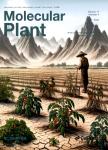Translate Plant Metabolism into Modern Agriculture: A Starting Point
Translate Plant Metabolism into Modern Agriculture: A Starting Point作者机构:unknown
出 版 物:《Molecular Plant》 (分子植物(英文版))
年 卷 期:2012年第5卷第2期
页 面:291-293页
核心收录:
学科分类:0710[理学-生物学] 0832[工学-食品科学与工程(可授工学、农学学位)] 081704[工学-应用化学] 07[理学] 08[工学] 0817[工学-化学工程与技术] 070303[理学-有机化学] 0703[理学-化学] 083203[工学-农产品加工及贮藏工程]
主 题:Translate Plant Metabolism
摘 要:Plants, the primary producers on the Earth, use solar energy to convert CO2 and H2O into various organic compounds. Over the past 10 000 years, humans have exploited the plant synthesizing capability and developed agricultural practice to meet the basic needs for food, fiber, energy, chemicals, and medicines. Actually, all of the products are an assortment of compounds synthesized in plants though a variety of metabolic processes. It has been estimated that any given plant species can synthesize 5000-25 000 different compounds (Trethewey, 2004). More than 100 000 metabolites, which may account for approximately 10% of the total natural products, have been identified in the plant kingdom.



